SWEDISH SOUTH ASIAN STUDIES NETWORK
Report from visit to Karachi University 23 February 2003:
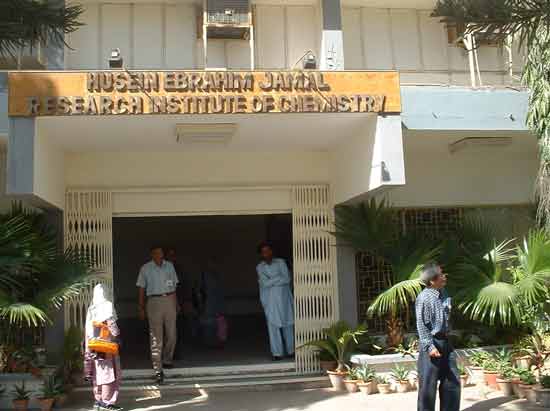 This day was reserved for one of our most important appointments during
our contact journey to Pakistan. We were going to meet Dr. Atta-ur-Rahman,
Chairman of the Higher Education Commission
of Pakistan (HEC). He is also the federal minister for Science and
Technology, and the Pakistani representative in COMSTECH,
the Organisation of Islamic Conference (OIC) Standing Committee on Scientific
& Technological Cooperation; based at Islamabad, Pakistan. COMTECH
promotes science and technology in the 57 OIC member states.
This day was reserved for one of our most important appointments during
our contact journey to Pakistan. We were going to meet Dr. Atta-ur-Rahman,
Chairman of the Higher Education Commission
of Pakistan (HEC). He is also the federal minister for Science and
Technology, and the Pakistani representative in COMSTECH,
the Organisation of Islamic Conference (OIC) Standing Committee on Scientific
& Technological Cooperation; based at Islamabad, Pakistan. COMTECH
promotes science and technology in the 57 OIC member states.
We met Dr. Atta-ur-Rahman at the Husein Ebrahim Jamal Research Institute of Chemistry, HEJ, in Karachi (as he also happens to be the Director of this institute) in a typical modern administrative South Asia-style building with a green lawn in front of the building (photo to the right). When we arrived Atta-ur-Rahman was busy with a meeting, but he soon joined us in a kind of session room, and we were served tea despite Ramazan (as non-muslim foreigners we were not expected to fast).
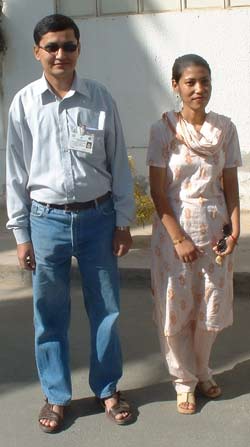
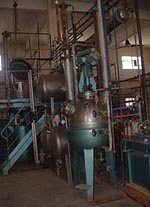 HEJ
is an internationally renowned institute with collaboration in 12 countries,
mostly Islamic. It has teachers and PhD students from a great many countries.
We met two young PhD students from Nepal – Krishna
Prasad Devkota (from the Institute of Forestry, Pokhara, half through
with his PhD studies at HEJ), and Rosa Ranjit
(from the Dept. for Organic Chemistry, Tribhuvan University, Kathmandu,
almost completed her PhD studies at HEJ) – photo to the right;
and two teachers – one from Japan and one from Kazhakstan. The institute
situated within the premises of the University of Karachi on the eastern
outskirts of the city, has excellent facilities, its own workshops for
producing substances and equipment (like glass bottles, etc) used in chemical
research, it has residential quarters for staff as well as students.
HEJ
is an internationally renowned institute with collaboration in 12 countries,
mostly Islamic. It has teachers and PhD students from a great many countries.
We met two young PhD students from Nepal – Krishna
Prasad Devkota (from the Institute of Forestry, Pokhara, half through
with his PhD studies at HEJ), and Rosa Ranjit
(from the Dept. for Organic Chemistry, Tribhuvan University, Kathmandu,
almost completed her PhD studies at HEJ) – photo to the right;
and two teachers – one from Japan and one from Kazhakstan. The institute
situated within the premises of the University of Karachi on the eastern
outskirts of the city, has excellent facilities, its own workshops for
producing substances and equipment (like glass bottles, etc) used in chemical
research, it has residential quarters for staff as well as students.
HEJ is interested in organising a PhD sandwich program for 20 students,
that is, two years of studies at HEJ and two years in a Swedish department,
and SASNET was asked to investigate about the possibilities for this.
Swedish universities are highly interesting as they do not charge any
tuition fees.
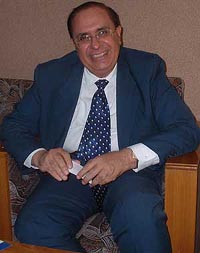 As
far as the whole of Pakistan is concerned, Dr. Atta-ur-Rahman
(photo to the left) suggested in our meeting that the Pakistani
government would like to send about 50 students for PhD studies to Sweden
per year during the coming 5 years. Pakistan already has such programmes
in Germany (Thübingen University) and Austria (University of Innsbruck).
As
far as the whole of Pakistan is concerned, Dr. Atta-ur-Rahman
(photo to the left) suggested in our meeting that the Pakistani
government would like to send about 50 students for PhD studies to Sweden
per year during the coming 5 years. Pakistan already has such programmes
in Germany (Thübingen University) and Austria (University of Innsbruck).
Out of the 50 students going to Sweden, 40 should be in sciences (biotechnology,
engineering, basic sciences, certain areas of medical sciences such as
pharmaceutics), and ten in other disciplines (out of which five might
be in Economics).
The background is that higher education and research is
severely underdeveloped in the country. Out of about 7 000 teachers at
the university level, only about 1 500 have a PhD degree. At present 200
students pass their PhD exams in Pakistan every year. The Higher Education
Commission of Pakistan, HEC, wants to increase this number to about 1
500 per year. This should to a large extent be realised by sending them
to universities abroad.
He wants SASNET to help in this. His idea is that there should be a Swedish
Reference Group (SRG) facilitating the programme by helping in selecting
and placing the students in appropriate departments. HEC would first announce
the positions, then select 150 – 200 candidates and send their applications
to the SRG for selection and placement of 50 students. HEC would then
pay for all the expenses of the students including travel and insurance.
HEC would also like the Swedish departments accepting these students to
conduct a qualification examination after one year of studies, to see
if the student is really qualified and makes progress in his/her studies.
If an agreement could be worked out Prof Atta-ur-Rahman was eager to start
sending PhD students as soon as possible, maybe already from 2004.
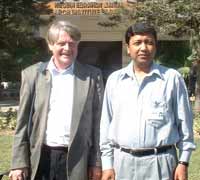 Prof.
Muhmmad Iqbal Choudhary (photo the left
along with Lars Eklund), who is acting director, then proceeded to
show us around the HEJ institute. It is well-equipped with computers linked
up by fibre technology and satellites to the national network to which
at present 37 universities in the country are connected. It means that
lectures can be shared within the country, and even that lectures held
at universities in other countries can be broadcast live in Pakistan.
Prof.
Muhmmad Iqbal Choudhary (photo the left
along with Lars Eklund), who is acting director, then proceeded to
show us around the HEJ institute. It is well-equipped with computers linked
up by fibre technology and satellites to the national network to which
at present 37 universities in the country are connected. It means that
lectures can be shared within the country, and even that lectures held
at universities in other countries can be broadcast live in Pakistan.
Earlier Prof Atta-ur-Rahman had informed us that the Higher Education
Commission of Pakistan has initiated a programme to make electronic journals
available to all universities. Right now 5 000 scientific journals are
presented in full-text on-line, and another 30 000 journals are to be
found with abstracts.
In this connection should be mentioned that the Virtual University was established in Pakistan two years ago, offering a 4 years BA in science. It now extends to 60 cities in the country and has enrolled 2 000 students who pay 25 US-dollars a month as fee. According to Atta-ur-Rahman the Virtual University is run after a hybrid model, including both distance education as well as going to course centres. We informed him about the advanced distance education that has been developed by Lund University, and the possibilities for cooperation in this field.
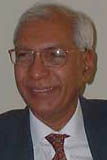 Later
on in the afternoon we met Prof. Syed Iqbal Mohsin,
the Dean of the Science Faculty (photo to the right). He informed
us that Karachi University at present has about 500 teachers, out of whom
300 are in the sciences departments, and the rest divide between arts,
pharmacology, engineering, and Islamic learning. Altogether 15 000 students
are taught within the university, while its affiliated colleges have another
85 000 students. The university was founded in 1951 (till then the only
university in Karachi was the University of Sindh, before the partition
affiliated to the University of Bombay); it has large scope for expansion
as there is much land available and enough faculty members. The only inhibiting
factors are lack of funds and insufficient laboratory equipment.
Later
on in the afternoon we met Prof. Syed Iqbal Mohsin,
the Dean of the Science Faculty (photo to the right). He informed
us that Karachi University at present has about 500 teachers, out of whom
300 are in the sciences departments, and the rest divide between arts,
pharmacology, engineering, and Islamic learning. Altogether 15 000 students
are taught within the university, while its affiliated colleges have another
85 000 students. The university was founded in 1951 (till then the only
university in Karachi was the University of Sindh, before the partition
affiliated to the University of Bombay); it has large scope for expansion
as there is much land available and enough faculty members. The only inhibiting
factors are lack of funds and insufficient laboratory equipment.
Syed Iqbal Mohsin is professor of Petroleum Science, an important field
in Pakistan as the country has large deposits of oil and natural gas and
hopes to reduce imports substantially. He asked us whether any Swedish
departments might be interested in collaboration, and we promised to explore
the possibilities to establish such contacts.
We also discussed the present low level of research and developmental
cooperation between Sweden and Pakistan, except in a few fields, and the
possibilities for revival of such. In the 1950’s the situation was
very different, there even existed a Pakistan-Sweden Institute. Sweden
was at that time heavily involved in a number of projects, including one
in family planning, and this continued through the 1960’s but then
petered out with the military regimes and the 1971 war.
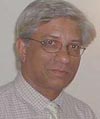 The
visit to the University of Karachi had been organized by Dr. Arif
Siddiqui, associate professor of Physiology at Aga Khan University.
He was a guest researcher at Karoliniska Institutet in 2001-02 working
together with Prof. Olle Söder.
The
visit to the University of Karachi had been organized by Dr. Arif
Siddiqui, associate professor of Physiology at Aga Khan University.
He was a guest researcher at Karoliniska Institutet in 2001-02 working
together with Prof. Olle Söder.
Arif accompanied us during the visit and on the way back we had a nice
treat of coffee and pakoras and fruits in his nice home, and met his family.
In the evening we were then invited by Prof Zulfiqar Bhutta for an Iftar dinner at a barbeque restaurant in Clifton, after first breaking the fast in his house with juice and delicious dates from Saudi Arabia.
SASNET - Swedish South Asian Studies Network/Lund
University
Address: Scheelevägen 15 D, SE-223 70 Lund, Sweden
Phone: +46 46 222 73 40
Webmaster: Lars Eklund
Last updated
2006-12-13
